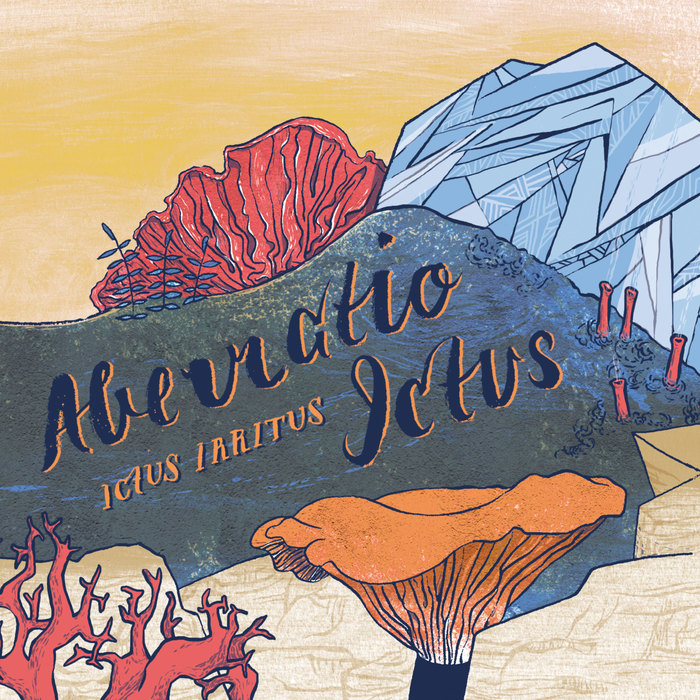Ictus Irritus by Aberratio Ictus
2015 WhyPlayJazz (RS022), CD + MP3 Album Download
Track listing
Line-up
Rea Dubach (voice), Laura Schuler (violin), Ronny Graupe (guitar)
Production credits
Recorded July 2014 and March 2015 by Marco Birkner at Studio H2 Berlin, Germany. Mixed by Jean-Claude Pache at Studio Barking Records Biel, Switzerland. Mastered by Klaus Scheuermann. Artwork by Andrea Perter.
The musical visions of Ronny Graupe (guitar), Laura Schuler (violin) and Rea Dubach (voice) range from minimalist/introverted to brute/wild. Despite the unusual lineup they manage to create an affectionate sound world with intimate intensity.
Time is ready – The debut album “Ictus Irritus” from Aberratio Ictus is here! After two years of intense investigation and development, we present with joy the result of our passionate work.
Aberratio Ictus – is Latin and means: „Someone doesn't meet the expected, but another person”.
The three musicians, Rea Dubach, Laura Schuler and Ronny Graupe have met 2013 and are meeting each other time and time again at various places in the world. In free play but also in the research of common musical visions, often they find themselves in the situation that they meet something completely unexpected. The first would like to establish contact with the second to get in a musical conversation. But this other musician hasn't arrived at the meeting point yet or has already passed it by. Suddenly there is a third person with whom the idea can be developed. The tension in the encounter of three individuals as well as the potential of failure, this among other things represents the fascination of Aberratio Ictus. The moment is here as meeting point and place where things happen. To capture it, let it go and move on in the organic progress of tension. This allows musical and human communication on a high level.
Aberratio Ictus is demanding and fascinating. Melancholic moments, dreaminess, joy, vitality to the point of hilarity and humor – Emotions remind us of the humanity of our perception.
The music coming out thereby can be minimalistic and introverted but also wild and brachial. Always though a special kind of intensity, generated through the encounter of different ideas is perceptible.
Because of the unusual instrumentation – Voice, violin and guitar – common band concepts have to be considered in a new way. Through common investigation the three musicians are searching for there authentic expression. They leave conventional sound aesthetics without fear of using elements from classical, jazz and folk music. This can be an old text written in Icelandic, a melody structure reminding of Bach or a sudden rustling with a piece of paper. Sound gets discovered in every moment.
With “Ictus Irritus”, the three musicians succeed in creating a very unique sound world. Everyone of the band have composed and together they arranged the pieces. Even though every piece has its one, distinguished aesthetic, one never loose the context to the sound of the whole album.
Reviews
Das klingt nach ausgetüftelten Klanglabor. Mit Spaß und Energie wird da gegen den Mainstream angespielt.
The music is a unique amalgamation of many elements, combined into an avant-garde tapestry of sounds, which touches Folklore, Jazz and contemporary Chamber Classical music, but beats any attempt of classification. It offers very little melody as such, and rhythmically is uneven and sometimes almost chaotic; in short it is mainly concerned with momentary happenings rather than development, which follows a pattern. As such it is very difficult to be absorbed by most conventional music listeners and has a very limited audience.
Wenn drei radikal-avantgardistische Individuen in einem Trio aufeinandertreffen, kann es gefährlich werden. Schlimmstenfalls entfernen sich die Musiker so weit voneinander, dass sie sich aus den Augen und dem Gehör verlieren. Das passierte beim Debütalbum des Trios Aberratio Ictus zum Glück nicht, obwohl auch bei Rea Dubach (voc), Laura Schüler (viol) und Ronny Graupe (g) ein Scheitern möglich gewesen wäre.
Aberratio Ictus ist ein Begriff aus dem Strafrecht und wird dort als eine Form des Irrtums definiert, der vorliegt, wenn der vom Täter gewünschte Erfolg bei einem anderen Objekt als bei dem von ihm ausgewählten eintritt. Das Trio präsentiert seine Musik als Musik des Moments, der im übertragenen Sinn als Hieb oder Schlag oder Wurf auftaucht, aber als unwirksam, vergeblich oder nutzlos erscheint.
Zwei Jahre benötigten Aberratio Ictus für ihr Debütalbum, immer wieder selbst überrascht, was in der Entwicklungs- und Endphase der Produktion so alles passieren kann. Was nicht nur mit der ungewöhnlichen instrumentalen Besetzung zu tun hat. Obwohl nur drei akustische Instrumente zum Einsatz kommen, überrascht die Klangvielfalt vom ersten bis zum letzten Ton. Die Entdeckung außergewöhnlicher bis undenkbarer Klänge machen den besonderen Reiz eines Albums aus, das viele offene Fragen beantwortet und dabei ständig neue aufwirft. Drängen Violine und Gitarre die Gesangstimme zu sehr zusammen (Nein), rüttelt die Musik an der Vorstellungskraft des Hörers (Ja), verändert Ictus Irritus die Hörgewohnheiten (Jein).
Das Spiel mit Erwartungshaltungen und Irrtum sind wesentliches Merkmal dieses Albums.
Experimenteller Gesang trifft auf Geige und Gitarre – in dieser ungewöhnlichen Kombination werden individuelle Momentaufnahmen präsentiert. Die freie Herangehensweise des Jazz wird genutzt, ohne sich auf dessen Attitüden zu stützen. Genau genommen ist auf dem Album kein Jazz zu hören, aber muss es das überhaupt? Vielmehr ist es melancholische Musik, bei der leider nicht immer klar wird, wohin die MusikerInnen wollen. Sie erschließt sich nicht auf Anhieb, bietet dafür dem Geduldigen aber einen authentischen Ausdruck frei von Klischees. Die kreativen Eigenheiten werden nicht zuletzt in den lateinischen Songtiteln betont, die manchmal Himmelsrichtungen bezeichnen, ohne den ästhetischen Kompass zu fest zu norden.
[...] So wechselt Rea Dubach zwischen Gesang, Beatboxing und diversen Formen der erweiterten Vokaltechnik, während Laura Schuler auf ihrem Instrument wahlweise Folkmelodien, barocke Stimmführung und atonale Zupfeinlagen hervorbringt, meistens in direktem Dialog mit der Gitarre Ronny Graupes, die wunderbar flexibel von spröden Stakkatofiguren über sanfte Basslinien bis zu diskreten Continuo-Akkorden ein beeindruckendes Arsenal an Gesten bereithält. [...] Für diese Musik braucht man Offenheit, die dann angemessen belohnt wird.
